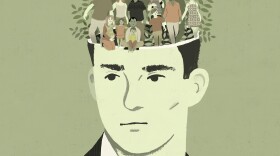
Jennifer Schmidt
Jennifer Schmidt is a senior producer for Hidden Brain. She is responsible for crafting the complex stories that are told on the show. She researches, writes, gathers field tape, and develops story structures. Some highlights of her work on Hidden Brain include episodes about the causes of the #MeToo movement, how diversity drives creativity, and the complex psychology of addiction.
Since joining NPR in January 2014, Schmidt has also worked as an editor on Morning Edition and All Things Considered. She has put together pieces for various news desks, including a story about survivor goats from the California wildfires for NPR's health blog Shots and a piece on a new trend in C-sections in which women can watch their babies being born which aired on Morning Edition.
The recipient of numerous journalism awards, Schmidt has been awarded a PRNDI for feature reporting, a National Headliners award for breaking news, a silver CINDY, an EMMA for editing, and various other awards from the RTNDA, the Associated Press, and the Society of Professional Journalists.
Schmidt's reporting has taken her across both the country and the world, from KPLU in Seattle and WBUR in Boston to freelancing in South Africa and Mexico. After living abroad for almost a decade, Schmidt now lives on a small farm near the Chesapeake Bay with a menagerie of animals including a one-eyed cat from South Africa, chickens, horses, two dogs from Mexico City, and goats.
Schmidt graduated magna cum laude with a B.A. from Middlebury College and an M.S. from the Medill School of Journalism at Northwestern University.
-
We know our actions affect those around us. But how do we know whether our impact is positive? This week on Hidden Brain, what it means to do good in the world.
-
Envy is one of the most unpleasant of all human emotions. This week, we explore an emotion that can inspire us to become better people — or to commit unspeakable acts.
-
The CDC estimated that 72,000 people died of drug overdoses in 2017. There are many reasons why the opioid crisis is so hard to confront. One of them is social stigma.
-
We all know the downsides of being poor. But what about the downsides of being rich? This week, we explore the psychology of scarcity...and excess.
-
As many as 40 percent of students who intend to go to college don't show up in the fall. Education researchers call this phenomenon "summer melt," and it has long been a puzzling problem.
-
There can be a lot of psychological noise involved in learning. And mental chit chat can make learning hard. One solution, silence it with a click.
-
The eugenicists were utopians, convinced that they were doing hard but necessary things. And that included making decisions about who gets to have children.
-
Violent crimes committed by Muslims are much more likely to be reported as "terrorism." And that has disturbing consequences for the way Muslims are perceived.
-
Have you ever noticed that when something important is missing in your life, your brain can only seem to focus on that missing thing? Two researchers have dubbed this phenomenon "scarcity."
-
A culture of racism can infect us all. On this week's radio show, we discuss the implicit biases we carry that have been forged by the society around us.









